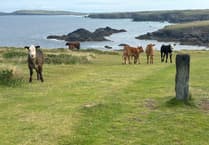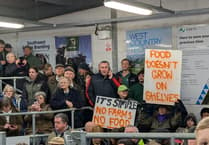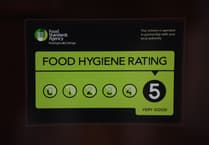A descendant of Dr Miles Marley, who is said to have been the inspiration for the character Jacob Marley in Charles Dickens’ ‘A Christmas Carol’, contacted the Post earlier this year hoping to find out more about his familial connection and has since paid a visit to St Endellion, the resting place of his ancestor.
The Post put Mr Christopher Marley, of Kent, in touch with local historian Barry West who has conducted much research into the Cornish connection the world famous play and its writer has.
Mr West was only too happy to help and soon established the connection between Mr Marley’s great, great grandfather and the great Mr Dickens which helped make his a household name.
In an article written to ‘The Daily Telegraph’ Miss M M Lloyd gives an account of the name Marley. Her grandfather was Dr Marley, who had a practice at 11 Cork Street in London. He was an Irishman and on one St Patrick’s Day he gave a dinner, at which Dickens was a guest. During the dinner the subject of strange surnames came up and Dickens said he thought the name Marley to be a most uncommon one, where upon he said: “Your name will be a household word before the year is out.”
And indeed it was.
Looking further into this connection, Mr West ascertained that this was Dr Miles Marley, who later moved to Cornwall when his health deteriorated, to be near his son Dr Henry Frederick Marley.
Mr West said: “The name Marley has been immortalised by his writings of A Christmas Carol. It captured the imagination of those that read it in 1843 and it still does today.
“I was fortunate enough to meet Christopher Marley at St Endellion Church, high on the hill above Port Isaac where Dr Miles Marley the man who was to become Jacob Marley in Charles Dickens’ novel A Christmas Carol spent his final days.
“His health had taken a turn for the worse and he, it seems, came to be closer to his son who was the doctor at nearby Padstow.”
The words on his memorial read: “Miles Marley. Surgeon. Of this Parish. Who died on this the 15th Day of November in the year of our Lord 1854 aged 56 years.”
Mr West continued: “Dr Miles Marley specialised in the diseases of women and children. He, Charles Dickens, as a writer was concerned about the social inequalities in society and was a campaigner for social reform, he was clearly in every means available raising concerns about poverty in England and the poor working conditions for women and children.
“We know that he had the previous year in 1842 toured Cornwall with his friends and his biographer. They went to Lands End where he and his friends saw Long Ships lighthouse and they also it seems most likely visited Botallack where the mines ran under the sea and the men were working in terrible working conditions.
“He would have met and seen the poor working conditions of miners here in the county so that is why they appear in the novel.
“The story is one about ghosts, poverty and about Christmas-elements that captured the imagination of generations of the past and still true today. It is a classic novel and an important historical piece of literature.”
The Post caught up with Mr Marley after his visit to St Endellion to find out how it had gone.
He said: “We are originally from Sussex and now live in Loose in Kent, but we love the West Country and often visit when we can. We normally stay at Trebarwith Strand but have enjoyed visiting other places nearby.
“It has been wonderful to find a family connection and visit the grave of my great, great grandfather and we intend, once this horrid COVID situation is over, to visit more often and continue our research.”
Mr Christopher Marley said his journey to discover more about his family history all started when his eldest daughter, Emily, undertook some genealogy research.
He said: “To be honest we have often overlooked the Marley side of the family because of our other family connections. My family is split between the Marleys and the Staffords. My great, great, great grandfather was the first prime minister of Australia so we have always erred on that side of the fence.
“However, my daughter decided we should investigate the Marley side. In doing so I came across your article online and it said ‘if interested make contact’, so I did.
“When I contacted you I was shocked to receive a reply within minutes asking if I wanted to speak to Barry. Then when I agreed and Barry contacted me five minutes later, I have to say I was knocked sideways — I hadn’t thought much would come of my message.”
He said he was most appreciative of the help he had received from Mr West and was delighted with the information they had been able to find.
When looking at the grave of Dr Marley, Mr Marley also discovered some extraordinary coincidence: “I was astonished to see two names on the grave which are the same names given to my family members. There is an Emily on there, which is the name I gave my eldest daughter, and my granddaughter is Isabel and there is an Isabella on the grave.
“I had no idea beforehand of these family members’ names and it is quite extraordinary that we too should have chosen those names.”
Mr Marley said the quest for more information will continue and hopes to work alongside Mr West in the coming years to find out more: “Barry has already started to dig into the background of Miles Marley’s parents, who were from Ireland. My wife’s family also have links to Ireland and we hope to travel there when we can to investigate both our family histories further.”





Comments
This article has no comments yet. Be the first to leave a comment.